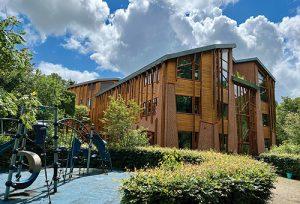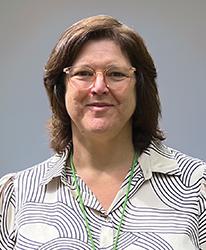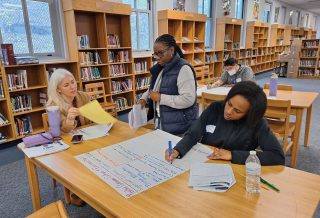MEMBER SPOTLIGHT
Team learning is built into Netherlands school’s structure
By Sarah Grace
Categories: International perspectives, Learning communities, School leadershipJune 2024
Sarah Grace has served as the International School of Amsterdam’s associate director for teaching and learning and is currently head of safeguarding and wellbeing. The school is the first in the world to be authorized to offer the International Baccalaureate (IB) Primary Years Programme, Middle Years Programme, and Diploma curriculum from preschool to grade 12. The school is known for attracting and retaining talented faculty from around the world, in part due to its professional learning hub, the Centre for Development, Learning and Technology, which hosts hands-on learning opportunities for educators across Europe and beyond. The center provides a forum for educators to network and share ideas with field experts and partners, such as Harvard’s Project Zero.

How have you seen professional learning enhance teaching and learning at your school?
Ongoing professional learning is part of our mission, and it’s often one of the reasons faculty or administrators come to our school and why they stay. Faculty often apply to our school after coming to do a training with us. I’ve been at the school for 25 years now, so I’m an example of somebody who has been there a long time.
Inquiry is an important part of our professional learning. For example, we’ve been using thinking routines with our students for many years. A former director reflected on how we were developing a culture of thinking for our students and wondered what would that look like for our faculty. This led to a professional action research initiative called the Thought-full Schools Project, which is now embedded in the school. Teachers who are already tenured and have been through the formal teacher evaluation cycle their first three years can choose to do their own action research, arising from something with the students in their classroom.
This year, using the IB’s program development inquiry cycle, every faculty member was looking at how to be explicit about the approaches to learning in their own practice. Each teacher chose a thinking routine to implement to make a targeted learning skill more explicit for students. They had to choose one of the five skills areas in the IB programs: thinking, communication, social, research, or self-management. Then they had to gather evidence of the impact of the use of the routine.
On our last professional learning day, faculty met in learning trios across the IB programs to share what they learned from their work this year. We deliberately mixed them up across the lower, middle, and high schools to exchange the impact of the routines on their students. This helped them understand how the curriculum spirals, and they gained insight into what’s happening throughout the school. They loved learning from each other. When you can hear a teacher of 12th graders talk about what they’ve learned from listening to a kindergarten teacher, it’s really powerful.
''When you can hear a teacher of 12th graders talk about what they’ve learned from listening to a kindergarten teacher, it’s really powerful.'' - Sarah Grace, International School of Amsterdam #TheLearningPro… Share on X
#TheLearningPro… Share on X
How does your school tailor professional learning for educators’ needs?
We have a dedicated budget that provides professional learning in the IB programs, initiatives, and goals laid out in the school’s strategic plan. But we also think about every person’s own development, as they’re at different stages in their careers. In addition, there is a personal professional development allowance and, as professional learning is not just for faculty, every staff member receives this. This allows for equity in access to ongoing personal learning and provides agency for staff in seeking experiences that help them at that point in their career. For example, a member of the admissions department might elect to take some professional learning in marketing, and someone from communications might want to learn about improving parent communication.
Team learning is built into the school’s structure. We have grade-level teams in the lower school and departments based around the disciplines in the middle and high school. The teams work on a group goal that supports the school’s strategic plan, and they have their own team goals each year. These might arise out of their practice. This can be something that they’ve already uncovered the previous year or from reviewing unit assessments. For example, in the lower school, a goal may be developed following the reading assessments in a grade level. If teachers see a pattern across the grade, there might be something they need to change in the way that they’re teaching reading.
We have a relatively new initiative of peer coaching, where some of our teachers have participated in additional learning so they can then give more one-on-one support or provide short training experiences. For example, some peer coaches led a well-received session for staff on resilience. Another teacher is piloting a peer-on-peer feedback initiative with some colleagues as an alternative to formal teacher evaluation.
Why do you value Learning Forward membership, and what resources are particularly useful to you?
I first learned about Learning Forward during COVID-19, when I took an online course in which Learning Forward was listed as a resource. Then I took a couple of webinars — one was a conversation with Angela Ward, others included how to learn from the pandemic and virtual leading and learning in unique contexts.
In November 2022, I signed up for one of the courses on the new Standards for Professional Learning with our adult learning coordinator. We really liked the research-based approach and the way that the equity lens was coming through in the new standards. We enjoyed the course, even though it was starting at 9 o’clock at night for us. We felt so lucky to have vibrant professional conversations in breakout sessions and learn from other people who were working in very different contexts to ourselves.
I was impressed, so I joined as a comprehensive member to have more access to the resources. Some of the books that I receive are really helpful. In particular, Street Data (Corwin, 2021). We even plan to bring co-author Shane Safir to our school next year as a result. Assessing Impact (Corwin & Learning Forward, 2017) was another, and, most recently, The Age of Identity (Corwin, 2023) — in an international school, we are very conscious about culture and identity, so that’s really useful. We’ve been doing a lot of work with gender identity in particular and are thinking about intersectionality. A lot of our students are either global nomads who have never lived in the country of their nationality or have dual nationalities.
With The Learning Professional magazine, I like reading about what’s happening in other places and the research focus. The recent section on wellness links well with my safeguarding work in terms of wellness strategies that we need to put in place.
How are you developing your school’s well-being strategy?
I’m working on developing the school’s well-being strategy, as well as looking at how can we improve workplace culture, especially in terms of addressing school-based stress. We’re a high-achieving school, and that comes with high expectations as well.
We’ve been doing surveys of our staff and looking at our data, including psychosocial aspects of employee health and well-being. As a leadership team, we are also looking carefully at other data, such as absenteeism rates. For instance, if we’ve got more people on long-term absence, we’re trying to determine if it’s work-related. If so, how can we turn that around? And what other things do we need to be doing as a school?
If you’re attending to the problems and the issues all the time, it’s important to remember to celebrate the achievements and thank people. I think sometimes we don’t do that well enough, that appreciation piece. If you take care of your staff, they’re going to be more engaged, and they’re going to take care of the students. That’s a no-brainer, really.
Download pdf here.

Sarah Grace is head of safeguarding and wellbeing at International School of Amsterdam, The Netherlands. https://learningforward.org/author/sarah-grace/
Categories: International perspectives, Learning communities, School leadership
Recent Issues
BUILDING BRIDGES
December 2024
Students benefit when educators bridge the continuum of professional...
CURRICULUM-BASED PROFESSIONAL LEARNING
October 2024
High-quality curriculum requires skilled educators to put it into...
LEARNING TO PIVOT
August 2024
Sometimes new information and situations call for major change. This issue...
GLOBAL PERSPECTIVES
June 2024
What does professional learning look like around the world? This issue...












